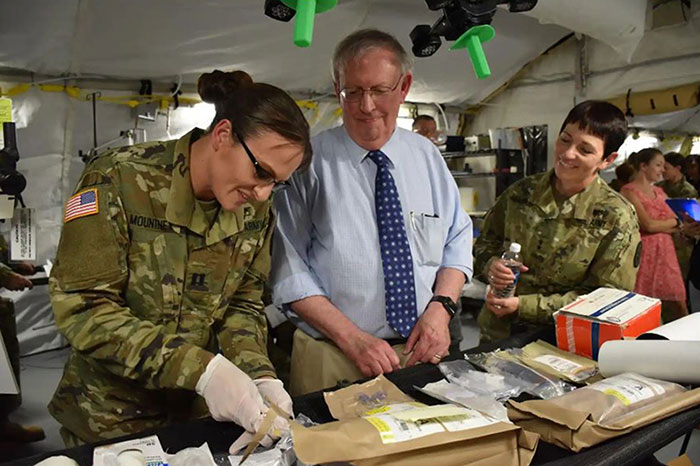'The Army is a team sport' - 'Respect' drives USAMMDA product manager to success

Halfway between Philadelphia and Allentown sits Harleysville, Pennsylvania. Home to roughly 9,900 Pennsylvanians, it has a long Mennonite heritage, the annual Apple Butter Frolic, and is the childhood hometown to one U.S. Army Maj. Andrea Mountney.
Today, Mountney serves with the U.S. Army Medical Materiel Development Activity at Fort Detrick, Maryland. As a Deputy Project Manager, Warfighter Protection and Acute Care (WPAC) Project Management Office, Mountney has her finger on the pulse of the team developing military medical treatments, vaccines, drugs, blood products and preventative care technologies that will one day help protect and sustain Warfighters across the globe.
Her bedrock value, the ethos that helps sustain her as a Soldier-Scientist on the forward edge of military health product development, one of her main reasons for serving? Respect.
"Our teams bring together a myriad of personalities and perspectives from across the [Department of Defense] and cannot effectively function without 'Respect,'" said Mountney, who has served in the Army since commissioning as a second lieutenant in 2013. "The Army is a team sport. Each individual has a role to play, and each person brings a unique perspective, set of experiences, and approach to solving problems. As leaders, it is important that we create the conditions and emulate the behaviors that promote mutual respect so that each team member can bring their best self forward and we continue to develop and deliver medical capabilities to the Army and our joint forces."
Mountney has served in a variety of roles, including supporting 'Operation Warp Speed,' the U.S. National Vaccination Campaign during the COVID-19 pandemic. She is no stranger to the flexibility and cooperation required to succeed as a member of a team dedicated to developing the treatments and products that preserve and protect America's Warfighters. The WPAC mission is a complex one and calls for a certain temperament to fully contribute as a leader among leaders.
The lessons of adaptability in the face of uncertainty, the hectic pace Soldiers maintain day-to-day, have served to help Mountney grow as a Soldier and as a leader, she said.
"[I have learned to] operate (continuously) outside of my comfort zone. The Army will challenge you. It is an evolving machine in which the jobs, people, and leaders continue to change," said Mountney. "The Army provides resources for life-long learning. It encourages seeking new skills, credentials, degrees, and experiences which provide the tools needed to operate successfully outside of your comfort zone. And once you have mastered that challenge, the cycle repeats itself."
Mountney has an extensive resume. Before commissioning in the Army, she graduated from Ursinus College in Collegeville, Pennsylvania before earning her doctorate from Johns Hopkins School of Medicine in Baltimore. Impressive credentials for any doctor. So why does she prefer Army Combat Uniform and boots over medical scrubs and non-skid tennis shoes?
The answer lies in the advice she offers for up-and-coming Soldiers entering the medical products development field.
"I think 'Respect' is the one of the biggest ones. We work in an organization that's mission is to deliver medical products to the Warfighter," she said. "[W]e have individuals from multiple different skill sets, and each individual brings that unique perspective. So, if you're not living, breathing, understanding 'Respect,' you're not going to be able to capitalize on those individual strengths. [U]sing that Army value of 'Respect,' and always keeping it tucked away in your back pocket, and understanding it, is really important to getting the mission done.'













